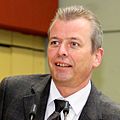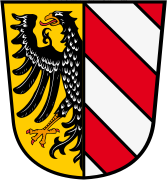Local election in Nuremberg 2002
The local elections in Nuremberg in 2002 took place on March 3, 2002 , as in all of Bavaria . In addition to the Lord Mayor of Nuremberg, the City Council of Nuremberg was also elected.
Starting position
In the local elections in Nuremberg in 1996 , the turnout for 349,787 voters was 56.8%. For Mayor was in the second round of voting in a runoff election against former Mayor Ludwig Scholz with 56.0% Ulrich Maly selected. The strongest faction in the Nuremberg City Council was the CSU with 43.7% of the votes (33 seats), ahead of the SPD (34.3%, 25 seats) and the Greens (8.1%, 6 seats). Since there is no 5 percent hurdle in local elections , the following parties are also represented: The Republicans (3.0%, 2 seats), Free Voters (2.9%, 2 seats), FDP (2.4%, 1 seat) and Die Guten (1.5%, 1 seat). The PDS (1.3%) and the ÖDP (1.3%) both just missed out.
Election of the Lord Mayor
In the major district cities of Bavaria , the title of the first mayor, directly elected by the citizens , is “ Lord Mayor ”. The city council in Nuremberg elects the second and third mayor from among its ranks. The incumbent Lord Mayor Ludwig Scholz from the CSU was voted out in the second ballot and replaced by his successor from the SPD Ulrich Maly .
First ballot
The official final result of the first ballot for the election of the Lord Mayor on March 3, 2002 was as follows:
| Political party | candidate | image | Votes (absolute) | Votes (in percent) |
|---|---|---|---|---|
| SPD | Ulrich Maly |

|
117,770 | 49.2% |
| CSU | Ludwig Scholz | 50,145 | 45.9% | |
| GREEN | Brigitte Wellhöfer | 3,681 | 1.9% | |
| REP | Walter Beisig | 3,413 | 1.8% | |
| The good ones | Nikolaus Struck | 2,325 | 1.2% |
Second ballot
Since both Ulrich Maly and Ludwig Scholz missed an absolute majority in the first ballot , there was a runoff between these two candidates on March 17, 2002.
| Political party | candidate | image | Votes (absolute) | Votes (in percent) |
|---|---|---|---|---|
| SPD | Ulrich Maly |

|
102,619 | 56.0 |
| CSU | Ludwig Scholz | 80,583 | 44.0 |
Election of the city council
As usual in local government , the Nuremberg city councils are volunteers. The professional city councils (referred to in Nuremberg as heads of the respective departments as speakers ) are directly elected by the city council for 6 years. You are a member of the city council and have the right to speak but not to vote. As a rule, the elections for the speakers in Nuremberg take place shortly before the next local elections.
The Nuremberg City Council consists of 70 members. Since there is no 5 percent hurdle , it is possible to get a seat with around 1.4% of the votes cast. In contrast to the federal and state level, election polls are rarely carried out at the municipal level. Therefore it was not possible to reflect the current mood in Nuremberg.
Each voter has as many votes as the city council has seats. In the local elections in Bavaria, voters can cumulate and variegate . Each eligible voter has 70 votes, which corresponds to the number of city council members to be elected. It is possible to give a candidate up to three votes. Candidates from different party lists can also be elected, but the total number of 70 votes must not be exceeded. It is also possible to tick an entire party list, with each candidate on the list receiving one vote. Candidates can also be removed from the checked list.
Election result
Official final result after counting all 428 voting areas:
| Political party | Votes (absolute) |
Votes (in percent) |
Change compared to 1996 (in percentage points) |
Seats |
|---|---|---|---|---|
| CSU | 5,472,565 | 43.6% | −0.1% | 32 |
| SPD | 4,959,919 | 39.5% | + 5.2% | 23 |
| GREEN | 734.720 | 5.8% | −2.3% | 4th |
| Citizens' initiative to stop foreigners | 291,309 | 2.3% | not started | 1 |
| FDP | 264,548 | 2.1% | −0.3% | 1 |
| The good ones | 255.899 | 2.0% | + 0.5% | 1 |
| Free voters | 176.285 | 1.4% | −1.5% | 1 |
| REP | 171 455 | 1.4% | −1.6% | 1 |
| PDS | 155.283 | 1.2% | −0.1% | - |
| BIL | 78,577 | 0.6% | not started | - |
- Allocation of seats in the Nuremberg City Council since 1946 at the beginning of each legislative period

Postal vote
For all elections, the citizens of Nuremberg can apply for the postal voting documents online before they receive the voting notification.
See also
- Results of the local elections in Nuremberg
- Local electoral law (Bavaria)
- Administrative division of Bavaria
- List of mayors of the city of Nuremberg
Web links
- City of Nuremberg: Results of local elections 2002 - election results 2002
- City of Nuremberg: Elections in Nuremberg - election results and announcements
- City of Nuremberg: Local election in Nuremberg - information and results
Individual evidence
- ↑ a b c Official final result of the city council election of March 10, 1996 [PDF] on nuernberg.de, accessed on January 30, 2020
- ↑ Results of the mayoral election 2002. Accessed on January 30, 2020 .
- ↑ No later election: Small parties flash off in the city council. April 11, 2019, accessed June 13, 2019 .
- ↑ a b Results of the city council election 2002. March 11, 2002, accessed on January 30, 2020 .



